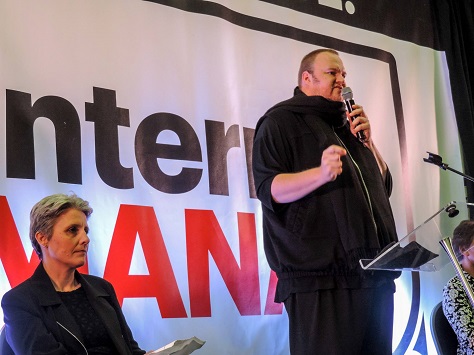There was never much doubt that John Key would win a third term as New Zealand’s prime minister in the face of a hapless New Zealand Labour Party that has struggled to find a compelling leader.![]()
Although he didn’t win any seats in New Zealand’s House of Representatives after the September 20 general election, Kim Dotcom (pictured above) managed to turn an otherwise boring election into a rollicking debate over Internet freedom and surveillance in the digital era.
How did a German-born fugitive fighting extradition to the United States become the sensation of the New Zealand general election? And why did, NZ$ 4 million (around US$ 3.25 million) in campaign spending later, does the Internet sensation have nothing to show for his initial foray into New Zealand’s national politics?
Dotcom formed the Internet Party in March. By July, he announced it would ally with the left-wing MANA Movement, an alternative indigenous party founded by former MP and former Māori Party member Hone Harawira in 2011. The two groups, however, always made for strange political bedfellows. It was never incredibly clear how Dotcom, with his agenda of international Internet freedom, found common cause with Harawira.
As recently as early September, Internet-MANA was winning 3.5% of voter support, which turned out to be Dotcom’s campaign high-water mark. By the time voters actually got around to voting, they only gave Internet-MANA 1.26% of the national party vote, not enough to deliver even a single seat, and not enough to reelect Harawira in the Te Tai Tokerau constituency.
Dotcom accepted full blame for the defeat after the election, acknowledging that he had become an easy target for his political opponents:
Internet Party leader Laila Harre has admitted that the gamble her party took with Mana had not worked. It follows the party’s founder, Kim Dotcom, last night saying Internet-Mana had lost support because of him.
“The brand Kim Dotcom was poisoned … and I did not see that before the last couple of weeks,” he said as results from New Zealand election 2014 rolled in last night.
Key said after the election that it’s now time for Dotcom to ‘go away:’
“I think a lot of middle New Zealand rejected the notion of a group of foreigners coming in and looking like they wanted to have a very heavy influence on a general election that is New Zealand’s election.”
Dotcom’s future remains murky amid efforts by US authorities to have him extradited on criminal copyright infringement charges related to his now-shuttered Megaupload website.
So much for resolving his issues through political channels.
Dotcom, who moved to New Zealand in 2010, and who lives in an opulent mansion outside of Auckland, was subject to a raid by the US Federal Bureau of Investigation in 2012 that elevated him from fugitive to superstar. The United States confiscated many, though not all, of Dotcom’s assets in the raid.
As a non-citizen, Dotcom — born in 1974 as Kim Schmitz in northern Germany near the Danish border — could not stand as a candidate for New Zealand’s House of Representatives. Nor did he serve as leader of the Internet Party, deferring instead to Harré, a former left-wing New Zealand MP.
But Dotcom spent much of the campaign overshadowing not only Harré and Harawira, but figures like Key and Labour Party leader David Cunliffe, arguably sucking much of the oxygen out of a campaign already dominated by allegations of political scandal with accusations that Key’s government engages in widespread illegal eavesdropping and surveillance.
Harré and others, including voices within New Zealand’s Green Party, have argued that Dotcom’s heavy-handed and deep-pocketed entry into the country’s elections damaged not only the Internet-MANA campaign but the entire political left, helping deliver to Key and the center-right National Party not only a third term but the first majority government since New Zealand switched from a first-past-the-post voting system to a multi-member proportional representation system in 1996. Labour suffered its worst defeat since the 1920s, winning just over 24% of the vote.
Though Dotcom’s electoral prowess was always doubtful, his hubris wasn’t. Six days before the election, Dotcom hosted a ‘Moment of Truth’ event attended by former Guardian writer Glenn Greenwald, WIkileaks founder Julian Assange, who remains in asylum at Ecuador’s embassy in London, and former US National Security Agency contractor Edward Snowden, who now lives in Russia after revealing the extend of the NSA’s Internet surveillance activities.
Though Dotcom’s gathering attracted global headlines, arguably focusing international attention on some of the world’s most controversial figures in the realm of Internet privacy and freedom, the event was laced with outlandish allegations that Key has been in cahoots with the Hollywood executives who lashed out against Dotcom’s music piracy empire. By the end of the event, the ‘Moment of Truth’ rally more closely resembled a meeting of four Batman villains than a serious forum about Internet freedom and national surveillance policy.
Nevertheless, Dotcom’s attacks weren’t entirely smoke and no fire. Key has acknowledged that he seriously considered a mass surveillance program in New Zealand in response to cyberattacks but shut down moves toward the program in early 2013. On the day of the ‘Moment of Truth’ event, Key revealed classified documents designed to exonerate his government of the worst of Dotcom’s charges.
For a man who released a music album earlier this year, entering New Zealand politics may have been just a lark. But Dotcom’s efforts may have played a role in giving New Zealand its most stable center-right government in two decades.
